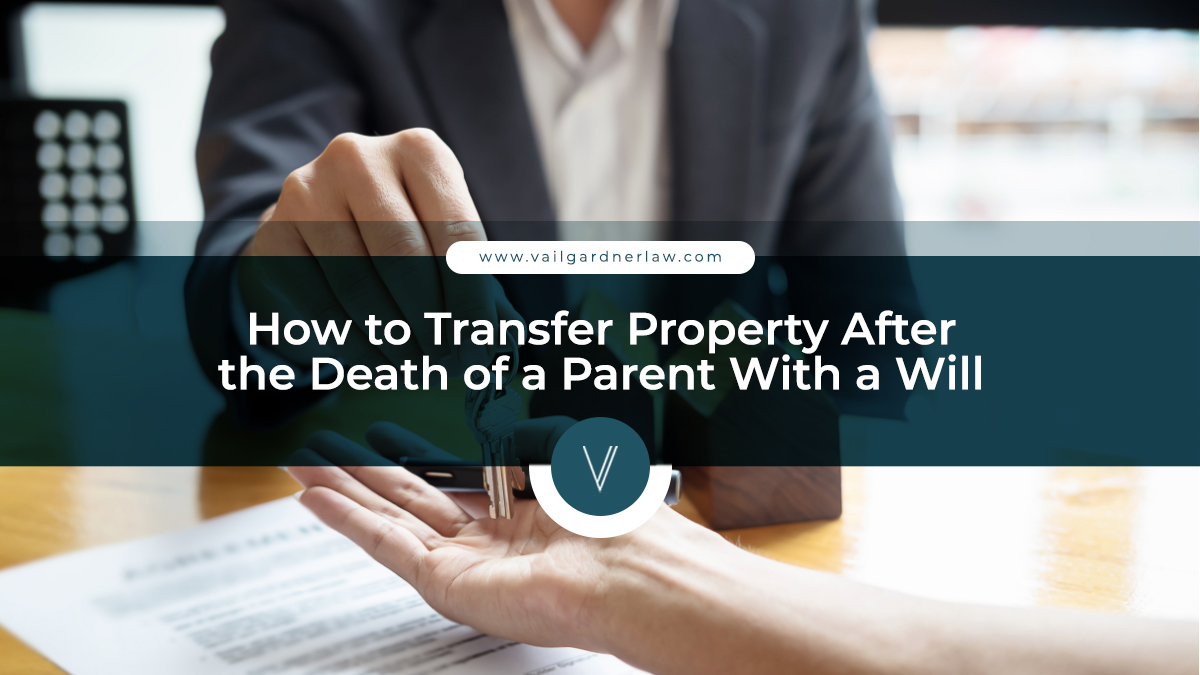Losing a parent is never easy, and the last thing you want is additional stress when it comes to handling their estate. If your parent left a will, you might feel a bit more at ease knowing their wishes are documented. However, understanding how to navigate the legal steps for transferring property can still feel overwhelming. You need to know how to transfer property after death of a parent with a will.
We’re here to walk through this process together, breaking it down into manageable steps so you can focus on what truly matters during this difficult time. Let’s get started.
How to Transfer Property After Death of Parent With Will
First Step: Obtain the Death Certificate
The first step in transferring property after the death of a parent is obtaining the death certificate. This official document is a vital piece of the puzzle, as it serves as legal proof of your parent’s passing. Without it, you won’t be able to proceed with most of the necessary steps to manage their estate.
You’ll need to request multiple certified copies of the death certificate from the vital records office in the state where your parent passed away. Having several copies on hand is crucial because various institutions—like banks, insurance companies, and government agencies—will require an official copy before they release information or allow you to take further action.
When it comes to transferring property, the death certificate is required to begin the probate process, which is the court-supervised procedure that authenticates the will and oversees the distribution of the estate. The death certificate confirms to the court and other parties that your parent has passed, making it possible to move forward with legal matters such as transferring the title of property to the rightful heirs.
In short, obtaining the death certificate is the first and essential step that unlocks the ability to manage and transfer your parent’s property according to their wishes. Without it, you’ll find yourself stuck at the starting line, unable to proceed with the necessary legal actions.

When Probate Is Necessary
In the state of North Carolina, the probate process becomes necessary when a deceased individual owned assets solely in their name. These assets could include a bank account, real estate, and other personal property.
It’s important to note that if the estate comprises these types of assets and their total value exceeds $20,000 (or $30,000 if the spouse is the sole heir), the probate process is generally required. This financial threshold means that even relatively modest estates may need to go through the probate process in order to ensure proper legal oversight and distribution of assets as per the law.
There is also a simplified affidavit process for spouses who inherit everything.
If you find yourself facing the probate process, rest assured that you don’t have to navigate it alone.
At Vail Gardner Law, we are here to help. Contact us today for a free consultation, and together, we will ensure that your loved one’s estate is handled with the utmost care and that your own estate plan is well-established and secure.
Assets That Avoid Probate Court
Did you know that not all of your assets have to go through probate? In fact, some assets can completely bypass the probate process altogether. Let’s dive into those next!
Life Insurance Policies
In North Carolina, life insurance policies provide a clear process for transferring benefits. The funds from these policies are paid directly to the specified beneficiaries, bypassing the probate process, unless there is no designated beneficiary.
Retirement Accounts such as 401(k)s and IRAs
Retirement accounts such as 401(k)s and IRAs usually allow for the designation of beneficiaries. This means that, similar to life insurance policies, the assets held in these accounts can be transferred directly to the named beneficiaries without the need for the assets to go through the probate process.
This can help streamline the transfer of these assets to the intended recipients and potentially avoid delays and costs associated with probate.

Trusts
Trusts are really important for planning what happens to your belongings after you’re gone. When you put your stuff into a trust, it can go straight to the people you want to have it, without having to go through a long legal process first.
Gifts Causa Mortis
“Gifts Causa Mortis” are gifts given when someone expects to pass away soon. These gifts are not usually included in the person’s will unless they’re needed to pay debts.
However, it’s important to be aware of the tax implications, especially for valuable things like stocks or real estate.
Bank Accounts: Payable-on-Death (POD)
POD accounts are an easy way to transfer money and assets to someone else. Many bank accounts and certificates of deposit let you name a beneficiary who will get the money if you pass away. For investment accounts with stocks or mutual funds, it’s often called a “Transfer-on-Death” or “TOD” designation. When you pass away, the money goes directly to the person you named.
Some Types of Jointly Owned Property
If you co-owned property in North Carolina with someone else and have the right of survivorship, the property automatically goes to the surviving owner if one of you passes away. This can help avoid the legal process of probate.

Transfer Ownership of a Vehicle Title After Death
In the case of mobile homes and jointly owned vehicles, when one owner passes away, the surviving owner becomes the full owner and can transfer the ownership using the deceased owner’s death certificate.
These arrangements can make it easier for the surviving owner and minimize the need for court involvement.
Simplified Probate Procedures for Small Estates
If your loved one’s estate is worth $20,000 or less (or $30,000 if the spouse is the only heir), North Carolina has a simple process for handling it. It’s called a “small estate” procedure.
This process is meant to make things easier for you during a difficult time. Instead of going through a formal probate proceeding, you can file an affidavit with the court. This allows you to collect and distribute the assets without dealing with complex legal matters.
This process is especially helpful when most of the estate’s value comes from assets that don’t go through probate.
When a Spouse Is the Only Heir
If the spouse is the only one who will inherit everything, the probate process can be made simpler. In North Carolina, the law allows the spouse to use a quicker process similar to a small estate affidavit, even if the estate is worth more than $30,000.
This means less court involvement and lower fees, making it easier to sort out the estate without delays.

Know Your Options
Understanding probate laws can be complex, but simplified probate options can save time, money, and stress. It’s important to have a clear understanding of the probate process and when it is required, whether dealing with a small or large estate.
Consulting with an experienced probate lawyer can ensure all legal requirements are met and the estate is settled in accordance with North Carolina law.
Vail Gardner Law Can Help
At Vail Gardner Law in Durham, NC, we understand that dealing with the legal process after losing a parent is emotionally challenging.
When your parent dies, and you’re faced with the task of transferring property ownership, you might feel overwhelmed by the steps involved, especially if this is your first time navigating such a complex situation.
Understanding the Probate Process and Why It Matters
One of the first steps in transferring property after the death of a parent with a will is entering the probate process.
The probate court ensures the will is validated and the deceased person’s property is distributed according to their wishes. If your parent owned real estate or other assets solely in their name, the probate process becomes essential to transfer ownership to the new owner or surviving heirs.
However, not all properties go through probate. For example, jointly owned properties with rights of survivorship or community property in community property states often pass directly to the surviving co-owner or spouse without needing probate.
At Vail Gardner Law, we know that understanding these distinctions is crucial in determining how to transfer the property efficiently. We walk you through each step of necessary estate administration.

Importance of Filing the Death Certificate
To start the probate process, you’ll need to file your parent’s death certificate and last will with the probate court. These documents are key requirements for transferring property after death. They provide legal proof of the owner’s death and enable the court to proceed with reviewing the will and overseeing the distribution of estate assets, including real estate.
Without the death certificate, you’ll face delays in transferring property, whether it’s a house deed, other real property, or bank accounts. If your parent’s estate qualifies for simplified probate procedures, such as a transfer on death deed or death transfer, having the death certificate on hand becomes even more critical.
The county recorder’s office will also require a death certificate when updating the property deed to reflect the removal of the deceased person’s name and the addition of the new owner’s name.
How Vail Gardner Law Can Guide You Through Transferring Property
Navigating how to transfer property after the death of a parent with a will can be a daunting task. Whether your parent owned property outright or had jointly owned properties, understanding the legal processes involved is vital.
At Vail Gardner Law, we take the time to guide you through each step, ensuring that all necessary documents, like the death certificate and property deed, are properly filed.
Our team can help you determine if probate is required for your parent’s estate, assist with the estate administration and probate process if needed, and ensure that property transfers happen smoothly. We also understand that every situation is unique—whether you’re dealing with community property, a life estate deed, or the transfer of real estate held in joint tenancy.
Let Us Help You Through This Challenging Time
You don’t have to navigate the complexities of transferring property alone. At Vail Gardner Law, we’re here to support you every step of the way, making sure that your parent’s wishes are honored and that the probate process is as stress-free as possible.
Contact us today for a free consultation to discuss your situation. Let us help you take the next steps in transferring your parent’s property.

